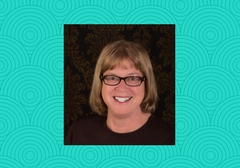Groundbreaking Collaborations
Kitty recruited and partnered with three other Senior Fellows and Friends who co-authored the 2017 ebook, Boundary Spanning in Practice: Broadening the Conversation. Her chapters are entitled, “Boundary Spanning as an Antidote for Boiling Frog Syndrome” and “Workforce Isolation and Agility Are Incompatible.”
The next project involved evening and weekend effort by nine colleagues in 2019, resulting in a second ebook, Unfettered: Mission-Aligned Boundary Spanning. One chapter, “What an Employee Can Do,” is accompanied by four animated scenarios that show how employees could get out of their silos to make their work more meaningful and have greater impact.
The most recent ebook project, completed in late 2021 by another nine colleagues in the SFF network, consists of written chapters, recorded roleplays depicting boundary spanning activity that actually took place, and three interviews describing results at different levels of scale. The examples at Permission to Practice: Public Service Boundary Spanning can be used by anyone who wants to develop this pivotal skill.
Other Representative Content from Kitty’s Body of Work
2024 Apolitical.co webinar with distinguished co-presenters in Colombia and Canada
Silos: Why they form and how to smash them
Articles written for Apolitical.co in 2022-2023
A UK-based international community for public servants with articles, workshops, and other content.
Give yourself permission to practice – my explanation of the 2021 ebook and an offer to talk further with other interested people.
Harness desire and curiosity to jump-start your career
Aligned boundary spanning is more effective
What power skills do you need to succeed in government?
Northeast Conference on Public Administration 2021
Panel discussion – Permission to Practice: Public Service Boundary Spanning – START AT 10:41
Track: Classic Issues in Public Administration
Australian i2insights systems thinking blog post 2021
How informal discussion groups can maintain long-term momentum
Interview about our second ebook with Andrew Everett, The Key Point
October 5, 2020 – 47 minutes – Book Review
American Society for Public Administration webinar: Building a Strong Professional Network – My 17-minute presentation begins at 33:05 after Alex Tremble presents. Q&A follows. ASPA membership has many benefits! See http://aspanet.org/ to find out more.
Art, Fear, and Leadership Development
On the relationship between commitment, risk, and the ability to create.
Read more (PDF)
Northeast Conference on Public Administration 2013
Intersection of Hierarchy and Network: a practitioner panel
Read More (PDF)
Social Strategist and Community Manager Badges conferred by The Community Roundtable & the Word of Mouth Marketing Association (WOMMA), 2012


Four New Models of Networked Leadership Development
Chapter in National Academy of Public Administration anthology, Innovations in Human Resource Management: Getting the Public’s Work Done in the 21st Century, M.E. Sharpe, 2009
Read More (PDF – pp. 7-19)
2010 Causey Award interview on Federal News Radio
https://federalnewsradio.com/causey-awards/2010/05/elizabeth-kitty-wooley-department-of-education/
My answers to the advance questions are repeated below.
- My best advice is to seek a way of working that you find meaningful and grow it into your life. Don’t wait for someone to give you permission; give yourself permission. Carve out some creative space in which you make and break the rules and get to choose as many times as you like. Whether it’s paid or not, think of your work as your craft – you are an artisan, who is developing more and more skill at work that matters to you. The satisfaction that results will help feed your spirit, and then your work will become useful to others.
- I encourage everyone to think about all the limitations we impose upon ourselves and drop the ones that don’t serve us any more. I look at this as a lifelong task. Every one of us has unrealized potential. We’re in our own way, a lot of the time.
- Not every program that purports to develop effective federal leaders actually does. The nice thing is, there are many actions we can take to develop our own leadership capacities, if we want to badly enough. That includes finding mentors or coaches who will tell us the truth. And we can exercise leadership behavior from wherever we are. When we commit to do the work, other people notice. Then they help – sometimes not until we’re at the end of our rope! This is something I had to experience over and over before I really understood it (slow learner!).
- People like to watch and give advice. Fewer people like to do the work! Want to stand out in a crowded field? Be one of the people who does the work. And help other people with theirs – collaborate across boundaries to deliver better solutions to public problems. Aim for results that would delight you, if you were on the receiving end.
- What if you knew you could not fail – what would you attempt? (This transformative question was given to me by GAO’s chief learning officer two years ago, and the answer gets a little clearer every day.)
- The United States is home to incredible diversity along every dimension. Although I haven’t traveled much lately, I enjoy visiting different climates (especially the desert), encountering lots of different people, and dining wherever the locals do.
- One of the best ideas I have seen is the OLPC – the tough, inexpensive, Web-enabled little laptop that was developed to improve educational opportunity and break the cycle of poverty in developing countries. Another is Ushahidi, software that any person or organization can customize to collect and visualize information. The name means “testimony” in Swahili – it was developed two years ago to map reports of violence in Kenya after an election. It’s being used on cell phones by citizens and aid workers in Haiti now, to communicate where all sorts of hazards and medical needs are.
- My colleagues are worthy of deep respect. The real story, that’s so ordinary it never gets told, is that a lot in government is going well – because people like the ones I work with are “on the case” every day, year in and year out.
